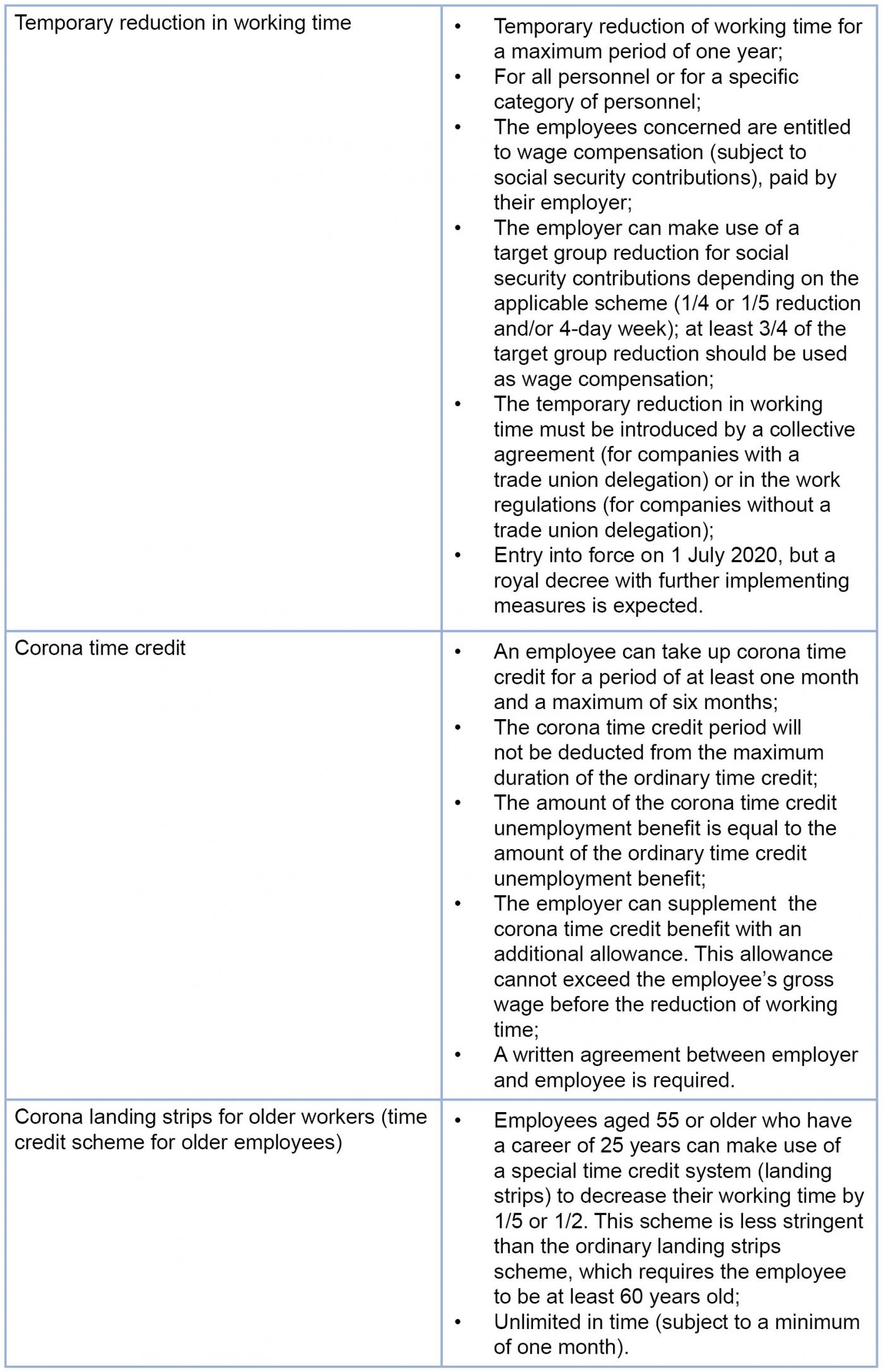Corona temporary unemployment (force majeure) vs. a new flexible transitional scheme of temporary economic unemployment (Royal Decree no. 46)
Royal Decree no. 46 introduces a more flexible scheme of temporary economic unemployment for companies which can no longer benefit from the enhanced and simplified regime of corona temporary unemployment (force majeure) after 31 August 2020, until 31 December 2020.
However, it is currently unclear which employers will still be able to benefit from the corona temporary unemployment scheme (force majeure) after 31 August 2020. The distinction between the two schemes needs to be clarified.
Royal Decree no. 45 extends the existing corona parental leave scheme, as introduced in Royal Decree no. 23 of 13 May 2020, until 30 September 2020.
The corona parental leave scheme co-exists with the ordinary parental leave scheme which allows parents to suspend their employment agreement partly or in full in order to take care of their child(ren).
Full-time working parents can take up corona parental leave to reduce their working hours by 1/5 or 1/2 if they have at least one child who has not yet reached the age of 12, or 21 years for a disabled child, and if the employee has seniority of at least one month with his/her current employer. Parents who do not work full-time but work at least 75% of a full-time equivalent can only reduce their working time by 1/2. Parental leave can be taken in a consecutive period until 30 September or per month or per week, either consecutively or not.
The right to corona parental leave is not granted automatically but requires the agreement of the employer. Royal decree no. 23 uses a shorter and more flexible application procedure than for ordinary parental leave. The application must be submitted at least three working days before the start of the parental leave, unless both parties agree to a shorter notification period. The employer must respond within three working days after the application.
During their corona parental leave, parents will receive an allowance from the National Unemployment Office that is 25% higher than the ordinary parental leave allowance.
Employees who currently benefit from ordinary parental leave in the form of 1/5 or 1/2 ordinary parental leave may, by mutual agreement with their employer, suspend their current leave or convert it into corona parental leave.
Single parents or parents with a disabled child can take up the corona parental leave full-time. The amount of the benefit is also increased to 150% of the amount of the ordinary parental leave benefit for single parents, and for parents with a disabled child. The benefit may not, however, exceed the total amount of the gross wage.
Finally, as a reminder, teleworking remains recommended for all companies, irrespective of their size, for all workers whose function allows this. If teleworking is not utilised, employers must guarantee maximum compliance with the rules on social distancing. This requirement is less stringent for companies in the critical sectors and for essential services; here, social distancing is required to be applied as far as possible.
The critical sectors and essential services are listed in an Annex to the Ministerial Decree of 30 June 2020 (See also our Flash of 6 May 2020).
Royal Decree no. 37 of 24 June 2020 grants the social inspection services the powers required to supervise the employer's compliance with the governmental measures to stop the spread of the coronavirus. All social inspection services can make use of their powers listed in the Social Criminal Code in this regard, including imposing preventive measures or temporarily discontinuing the company's activities to ensure the health and safety of workers at the workplace. Non-compliance with the government's corona measures can be sanctioned with a level-2 penalty, namely a criminal fine of between EUR 400 and EUR 4,000 or an administrative fine of between EUR 200 and EUR 2,000, multiplied by the number of workers concerned.
Conclusion
The impact of the coronavirus on the workforce remains massive and presents a major challenge for companies and social law. The primary focus of the HR measures initially was to take care of public health, prevention and protection at work. Enhancing human resources in the critical and vital sectors was the secondary focus. The next area that the government addressed was how companies can gradually rebuild their activities while avoiding massive redundancies. As during the 2008 crisis, the focus has now been set on reflation measures, such as collective working time reductions and time credit. Companies need tailor-made restructuring solutions to tackle the coronavirus crisis at company level. It is to be hoped that the new HR measures will suffice to save jobs, relax State intervention and enhance our economy.

